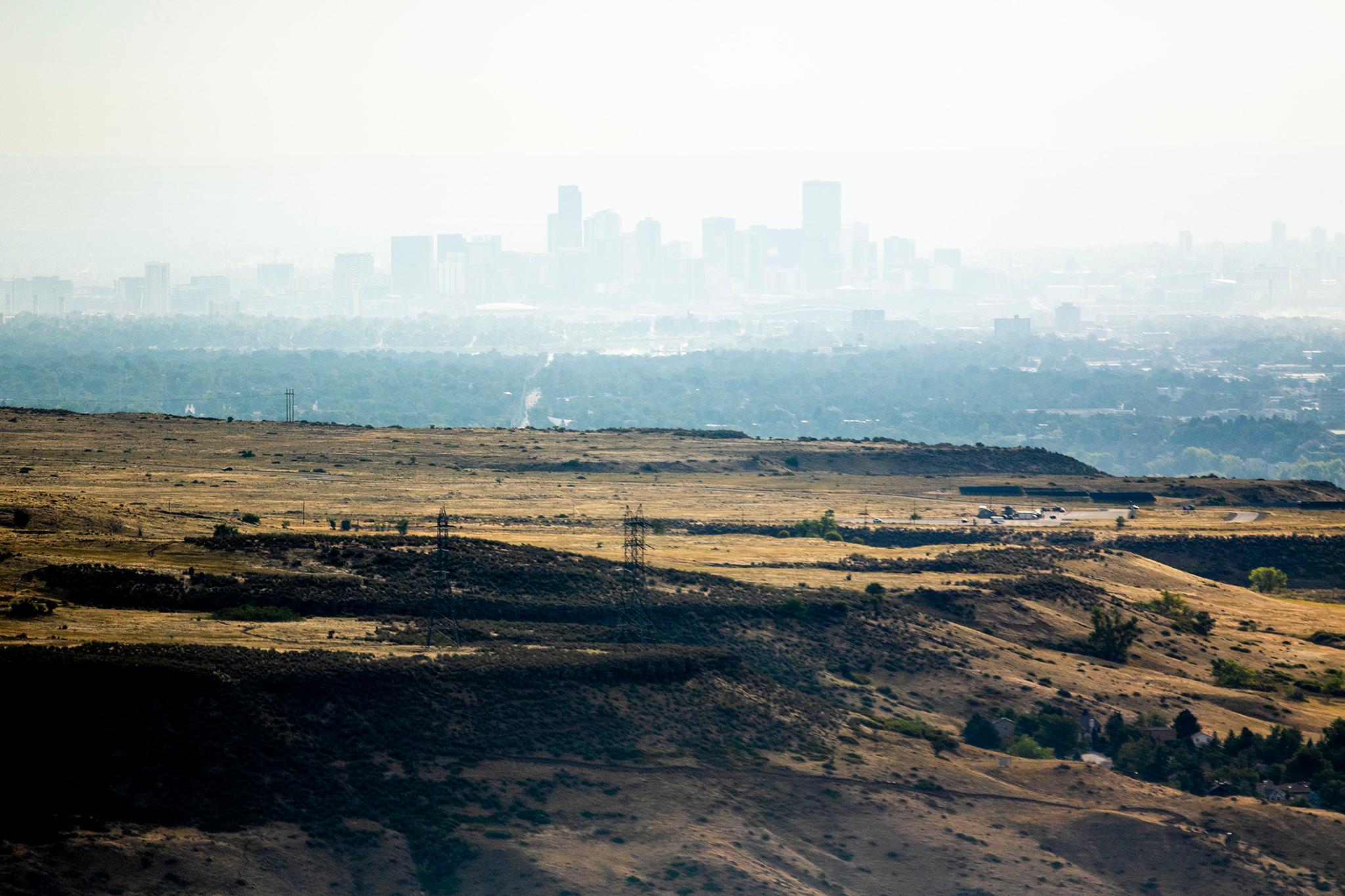In the Denver mayoral race, climate change has taken a backseat to issues like crime and homelessness.
The lack of discussion makes some sense if you're a political consultant. When Denverite surveyed more than 100 residents last summer, the environment ranked as the fourth most important issue behind housing affordability, crime and education.
Climate change is nevertheless one of the most pressing challenges facing the city. As global temperatures rise, Denver can expect dangerous heatwaves and more days with toxic air pollution. A climate-fueled drought is raising new questions about water conservation. And current leaders have committed to an ambitious plan to eliminate Denver's climate-warming emissions by 2040.
Ahead of the runoff, mayoral finalists Mike Johnston and Kelly Brough have released similar climate plans and committed to continue many of the city's efforts by signing onto a platform written by more than 30 environmental groups.
There is, however, one issue dividing the candidates: natural gas.

Denver estimates burning the fuel in buildings accounts for about a quarter of its climate-warming emissions. To limit pollution, Johnston plans to ban natural gas in all future construction. Brough, on the other hand, supports retrofitting buildings to run on electricity, but she worries a ban could falter due to legal challenges.
It's a subtle split, but some environmental advocates say it echoes the two candidate's vastly different track records on oil and gas issues. It's a history worth recalling as the candidates vie for Denver's top job.
Brough has been a frequent ally of the oil and gas industry.
After serving as the chief of staff for then-mayor John Hickenlooper, Brough took the helm of the Denver Metro Chamber of Commerce in 2009 and held the post for 12 years.
The business group has long represented some of the state's largest oil and gas companies. As CEO, Brough often spoke in favor of the industry as hydraulic fracturing helped drive a drilling boom along the Front Range.
After Longmont voted to ban fracking in 2012, oil and gas allies rallied in support of the industry at the state capitol. Brough attended as Chamber CEO and told Colorado Politics that "fracking is not a dirty word."
"As a matter of fact, it's been around for over 50 years, and we've proven multiple times that it is safe and can be done in a way that doesn't hurt us or our environment," Brough said at the time.
Brough echoed that message as she battled perennial efforts to restrict oil and gas drilling over the next decade. In op-ed pieces, official testimony and political ads, she took the lead on the Chamber's main argument: fracking didn't require Colorado to choose between the environment and the economy.
Many anti-drilling initiatives failed to make the ballot. When environmental advocates managed to put a question to voters in 2018, Brough joined a well-funded opposition movement against the plan to widen the buffer between buildings and new drilling sites. Voters rejected the proposal by double digits.
Brough's pro-industry advocacy extended into the state capitol as well. She pushed against landmark bills in 2019 to overhaul oil and gas regulations and establish Colorado's first targets to reduce its climate-warming emissions.
Pam Kiely, an associate vice president at the Environmental Defense Fund who fought for those proposals, says it's tough to separate Brough's personal values from her past advocacy on behalf of the Chamber.
"That's a stark contrast to the leadership we've seen out of Johnston," Kiely said.
When asked about that track record today, Brough sees no conflict with her current environmental platform.
Brough sees herself as a committed environmentalist who bought an early hybrid car and spent decades commuting by bike.
"As mayor, I'd get the opportunity to help others see that and change their behaviors," Brough said.
As for her past work for the Chamber, Brough says it came after recognizing that natural gas and other fossil fuels won't disappear overnight. She hoped to help small businesses deliver the cleanest fuel possible without eliminating production altogether.
Her platform was enough to earn the endorsement of state Sen. Chris Hansen, a former mayoral hopeful who often sponsors climate bills at the state legislature. Ean Thomas Tafoya, a climate justice organizer with GreenLatinos and another former candidate for Denver mayor, is now weighing his own endorsement.
While he often opposed Brough on state-level climate issues, Tafoya has not closed the door on supporting her campaign, noting her relationships with Colorado businesses could help advance the city's climate goals.
"Perhaps her connections could be useful," Tafoya said.
Johnston says he has a better track record on climate policy.
Education reform, not climate change, was a defining issue for Johnston as a state Senator from 2009 to 2015.
He nevertheless voted for some of Colorado's early efforts to confront climate change, including expanding the state's renewable energy standard and a tax credit for electric vehicles. Conservation Colorado, one of the state's leading environmental advocacy groups, gave his career voting record in the state senate a score of 97 out of 100.
Johnston later campaigned on tougher oil and gas regulators in two failed bids for statewide office. Running for governor ahead of the 2018 election, he called for wider setbacks to force drilling operators further away from homes. As a U.S. Senate candidate two years later, he released a "green new deal" plan built around a pledge to shift the county to 100% renewable energy by 2040.
Johnston says that background sets him apart from Kelly Brough and shows he's willing to take on powerful interests like the oil and gas industry.
"Our records are very different," Johnston said. "These battles are hard and so you gotta be willing to jump in and fight."
In his current mayoral campaign, Johnston said his plan is built around a greener energy grid. As Xcel Energy, Denver's power provider, transitions away from fossil fuels, Johnston says he'll push to electrify the city's vehicles and buildings to take full advantage of new clean energy sources.
"We know we can get electric energy that is both gonna be more sustainable for the climate and more sustainable for people's pocketbooks," Johnston said. "And so I think those would be my top priorities."
Johnston has also called for the city to ban the fuel from all new residential buildings.
Meanwhile, Brough supports a shift to renewable electricity for heating and cooking but worries a full ban could face legal challenges.
"Call me crazy: I think following the law is important," Brough said.
Her concern comes after a federal appeals court tossed out the country's first gas ban in Bekerely, Calif. In a decision earlier this month, the panel ruled federal law preempted the ordinance, throwing nearly 100 similar bans into question across the country.
It's unclear if the opinion would affect Denver's likely approach to the same policy. While Berkeley passed an ordinance banning the use of natural gas, Denver will likely use its building code to accomplish the same job.
The city has already approved a code to phase out gas from commercial and multifamily buildings. The question now is whether Denver will expand the policy to ban natural gas hookups in all single-family homes and residences.
Outgoing councilman Jolon Clark proposed the idea late last year but backed off when his fellow council members asked for more time to study a plan. He said it now will likely end up in the hands of the city's next mayor.
And given Denver's historical preference for mayoral incumbents, Clark expects they'll be guiding climate policy for a full three terms.
"We have to assume whoever wins this race in the driver's seat for the next 12 years," Clark said.
Editor's note: This story has been corrected to more accurately describe Pam Kiely's impression of Kelly Brough's advocacy work at the Denver Metro Chamber of Commerce.












